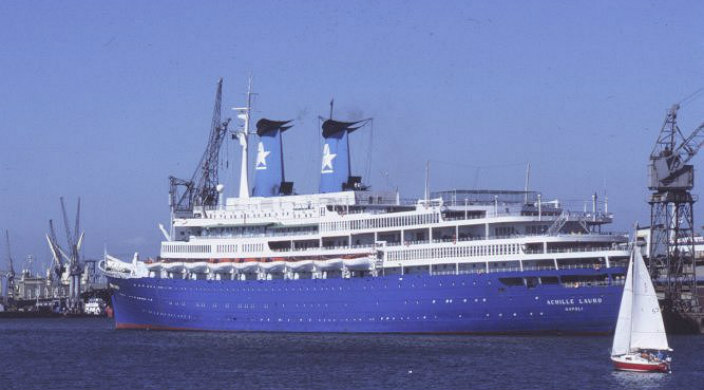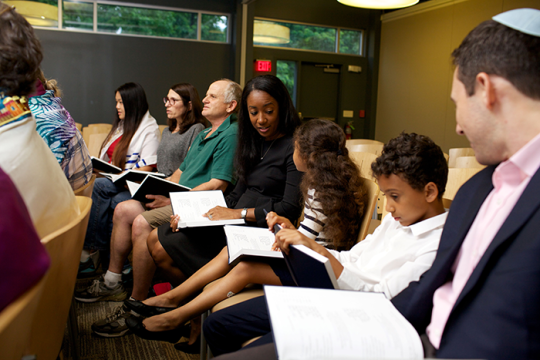
Leon Klinghoffer’s claim to fame would have been his invention of the Roto-Broil Rotisserie Oven had he and his wife, Marilyn, not taken an ill-fated Mediterranean cruise to celebrate their 36th wedding anniversary.
On October 3, 1985, the Italian liner, Achille Lauro, set sail from Genoa, Italy, where four members of the Popular Front for the Liberation of Palestine, using false documents, boarded and later commandeered the vessel. The terrorists demanded the release of 50 Palestinian prisoners in Israel, threatening to kill hostages if their terms weren’t met.
They carried out their threat on October 8, shooting wheelchair-bound Leon Klinghoffer in the head and chest before throwing him overboard.
Klinghoffer’s body was recovered and his funeral held at his Reform congregation in New York City, Temple Shaaray Tefila. Four months later, Marilyn Klinghoffer died of cancer.
Their daughters, Lisa (34) and Ilsa (28), filed a $1.5 million lawsuit against the Palestinian Liberation Organization. The case was settled out of court for an undisclosed sum and used, in part, to fund the Leon and Marilyn Klinghoffer Memorial Foundation of the Anti-Defamation League, dedicated to developing educational, legislative, and legal responses to terrorism.
Commenting on the significance of the Klinghoffer lawsuit, Juliette Kayam of the Harvard Kennedy School, noted,
“The idea that victims of terrorism would have a voice and get some remedy did not exist before…. Since that happened, families have a voice and, in the post-9/11 world, are not required to figure out how much the lives of [their loved ones] are worth.”
The family tragedy inspired two television movies: The Hijacking of the Achille Lauro (1989), in which Karl Malden played Klinghoffer, and Voyage of Terror: The Achille Lauro Affair (1990), starring Burt Lancaster and Eva Marie Saint. The sisters consulted on both, but were shut out of arguably the most controversial opera of modern times, the The Death of Klinghoffer (1991). Librettist Alice Goodman insisted,
“They had already been consultants for two docudramas, so it seemed to me they didn’t need a third…and [they] couldn’t really say this is all a private family matter because it had become part of the public discourse.”
Brought up as a Reform Jew in Minnesota, Goodman rejected what she describes as an attempt to instill Jewish identity by creating “a sense of us and them.” About halfway through writingThe Death of Klinghoffer, Goodman converted to Christianity and became an Anglican priest. “This caused our PR real embarrassment in a farcical way,” she said in a 2012 interview with The Guardian, because the team, including Pulitzer Prize-winning composer John Adams, director Peter Sellars (who teaches “Art as Social Action” and “Art as Morality” at UCLA), and choreographer Mark Morris, “had always said cheerfully that if anyone objected to the libretto, they could push me forward because I’m Jewish.”
The Death of Klinghoffer opens with the words of exiled Palestinians:
“My father’s house was razed/in 1948/When the Israelis/Passed over our street.”
Goodman contends that the intention of her libretto was not to be either “pro-Zionist, pro-Jewish, or pro-Palestinian, but all of these elements exist within it.” She acknowledges, however, that Peter Sellars, who was the impetus for the opera, has “strongly pro-Palestinian views.”
After seeing The Death of Klinghoffer at the Brooklyn Academy of Music in 1991, Lisa and Ilsa Klinghoffer denounced the opera as a perversion of “the terrorist murder of our father and attempts to romanticize, rationalize, legitimize, and explain it.” The issue arose again in 2014, when a New York Times editorial defended the “widely-praised opera” for “imagining a tragedy that gives voice to all sides” – a stance the Klinghoffer daughters called “an outrage” for exploiting their father’s death in the name of art.
The Metropolitan Opera staged the work with a “Message from Lisa and Ilsa Klinghoffer” in its program. They wrote,
“We… believe that theater and music can play a critical role in examining and understanding significant events. The Death of Klinghoffer does no such thing. It presents false moral equivalencies…and offers no real insight into the historical reality and the senseless murder of an American Jew.”
Rabbi Rick Jacobs, president of the Union for Reform Judaism, also affirmed the Met’s right to make decisions about what it stages but warned,
“Art that in its overall effect glorifies terrorism against innocents steps across a line, and this opera raises just such concerns.”
In solidarity with the Kinghoffer family, Judea Pearl, father of Daniel Pearl, the Jewish journalist murdered by a terrorist in Pakistan, responded to the Times editorial:
“We will never forgive [the Met] for poisoning our music, for turning our best violins and our iconic concert halls into megaphones for excusing evil.”
It is time to close the curtain on the Klinghoffer murder.
Related Posts

Crossing the Bridge from the Particular to the Universal

18 Jewish Reads for Tweens and Young Adults

